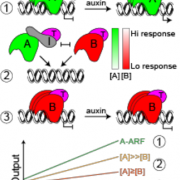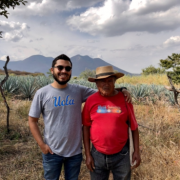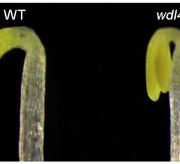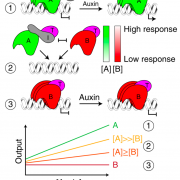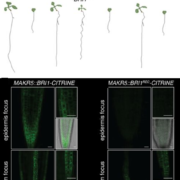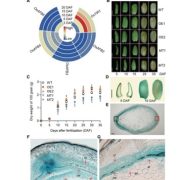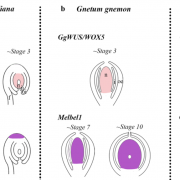RAF-like protein kinases mediate a deeply conserved, rapid auxin response
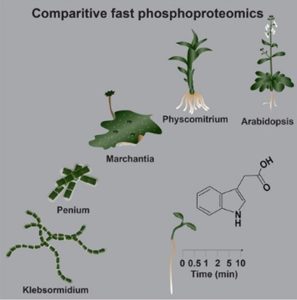 The definition of a phytohormone has not always been clear, though most plant biologists agree that phytohormones can be defined as endogenous molecules capable of triggering signaling cascades and associated responses by binding to specific receptors. They have been extensively studied in flowering plants, but in the last decade we witnessed a significant shift in research focus towards algae, bryophytes, and other land plants. This perspective provided novel insights into hormone evolution and their function. While metabolomics and genomics have proven that the synthesis of certain hormones in various algal sister groups of plants does occur, their role as true signals with a signaling machinery remains contested. A recent study by Kuhn et al. revealed that, like in Arabidopsis, auxin induces a global phosphorylation response in two species of streptophyte algae. The authors demonstrated that auxin induces membrane polarization and cytoplasmic streaming in Klebsormidium, classified as so-called ‘fast’ auxin responses. Phosphoproteomics further revealed a rapid, dynamic and auxin-specific phosphorylation response to be conserved in several lineages. In silico analysis then identified a group of B4 RAF-like kinases as central mediators of the auxin phosphoresponse. Moreover, loss-of-function mutant phenotypes and transcriptome analyses confirmed their crucial role in rapid auxin signaling, influencing overall growth and development. Despite the central involvement of these RAF kinases, the perception mechanism of auxin in algae remains unknown and will be an exciting topic for further investigation. (Summary by Thomas Depaepe @thdpaepe) 10.1016/j.cell.2023.11.021
The definition of a phytohormone has not always been clear, though most plant biologists agree that phytohormones can be defined as endogenous molecules capable of triggering signaling cascades and associated responses by binding to specific receptors. They have been extensively studied in flowering plants, but in the last decade we witnessed a significant shift in research focus towards algae, bryophytes, and other land plants. This perspective provided novel insights into hormone evolution and their function. While metabolomics and genomics have proven that the synthesis of certain hormones in various algal sister groups of plants does occur, their role as true signals with a signaling machinery remains contested. A recent study by Kuhn et al. revealed that, like in Arabidopsis, auxin induces a global phosphorylation response in two species of streptophyte algae. The authors demonstrated that auxin induces membrane polarization and cytoplasmic streaming in Klebsormidium, classified as so-called ‘fast’ auxin responses. Phosphoproteomics further revealed a rapid, dynamic and auxin-specific phosphorylation response to be conserved in several lineages. In silico analysis then identified a group of B4 RAF-like kinases as central mediators of the auxin phosphoresponse. Moreover, loss-of-function mutant phenotypes and transcriptome analyses confirmed their crucial role in rapid auxin signaling, influencing overall growth and development. Despite the central involvement of these RAF kinases, the perception mechanism of auxin in algae remains unknown and will be an exciting topic for further investigation. (Summary by Thomas Depaepe @thdpaepe) 10.1016/j.cell.2023.11.021


